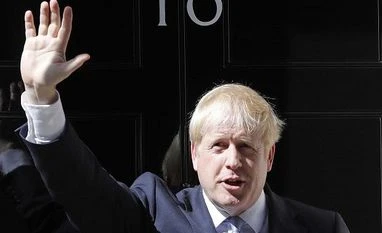Opponents of Prime Minister Boris Johnson, who has — unprecedentedly in modern times — prorogued Parliament to apparently prevent MPs and peers from thwarting a no-deal divorce from the EU, are expected to embark on a multi-pronged resistance to outmanoeuvre him in the legislature and the judiciary. Mass public protests are being planned as well.
The British Parliament will resume proceedings on September 3 after a summer recess and, given the prorogation, there is a narrow window of probably six days apiece in September and October to pass binding legislation to halt Britain’s exit (Brexit) from the EU without an agreement. This could happen if Johnson allows this by default, since the UK is, unless revised, set to leave on October 31. MPs could also send him packing with a no-confidence motion against his extremist Conservative party government.
It is an unusual no-holds-barred confrontation between Parliament and the judiciary in the mother of democracies. House of Commons Speaker John Bercow, holidaying in Turkey, described the government’s move as a “constitutional outrage”.
But opposition parties, led by the Left-wing Labour party, would need to coalesce with a chunk of Conservative rebels to specifically reject a no-deal Brexit. This is a tightrope walk wherein they perhaps need to focus on stopping no-deal rather than contesting prorogation. The groups are divided on issues of a general election and a second referendum. In a plebiscite in 2016, Britons voted to leave the EU by 51.9 per cent to 48.1 per cent.
Johnson notified prorogation of Parliament for five weeks in September and October. Three challenges to this move — in London, Edinburgh and Belfast — will be heard next week. Significantly, the application at the High Court in London, filed by activist Gina Miller, will be joined by former prime minister John Major, a Conservative predecessor of Johnson.
“I intend to seek the court’s permission to intervene in the claim already initiated by Gina Miller,” Major said, adding: “I intend to seek to assist the court from the perspective of having served in the government as a minister and prime minister, and also in Parliament for many years as a member of the House of Commons.” Such a ballistic intervention is almost unheard of in the UK’s history.
In Edinburgh on Friday, Judge Lord Raymond Doherty ruled against an interim injunction on the prorogation. He, however, ordered a full hearing of the case on September 3. The suit has been brought by 75 MPs. Their lawyer, Aidan O’Neill, argued Johnson should provide a sworn affidavit under oath, setting out why he needed to prorogue Parliament. He also stated he reserved the right to call Johnson to give evidence in court.
Major demonstrations against Johnson’s decision are expected to take place in about 50 cities and towns over the weekend. A foretaste of this was felt on Wednesday — the day the announcement was made — when spontaneous protests mushroomed near the iconic office-cum-residence of the British prime minister at 10 Downing Street.
To read the full story, Subscribe Now at just Rs 249 a month
Already a subscriber? Log in
Subscribe To BS Premium
₹249
Renews automatically
₹1699₹1999
Opt for auto renewal and save Rs. 300 Renews automatically
₹1999
What you get on BS Premium?
-
Unlock 30+ premium stories daily hand-picked by our editors, across devices on browser and app.
-
Pick your 5 favourite companies, get a daily email with all news updates on them.
Full access to our intuitive epaper - clip, save, share articles from any device; newspaper archives from 2006.
Preferential invites to Business Standard events.
Curated newsletters on markets, personal finance, policy & politics, start-ups, technology, and more.
Need More Information - write to us at assist@bsmail.in
)